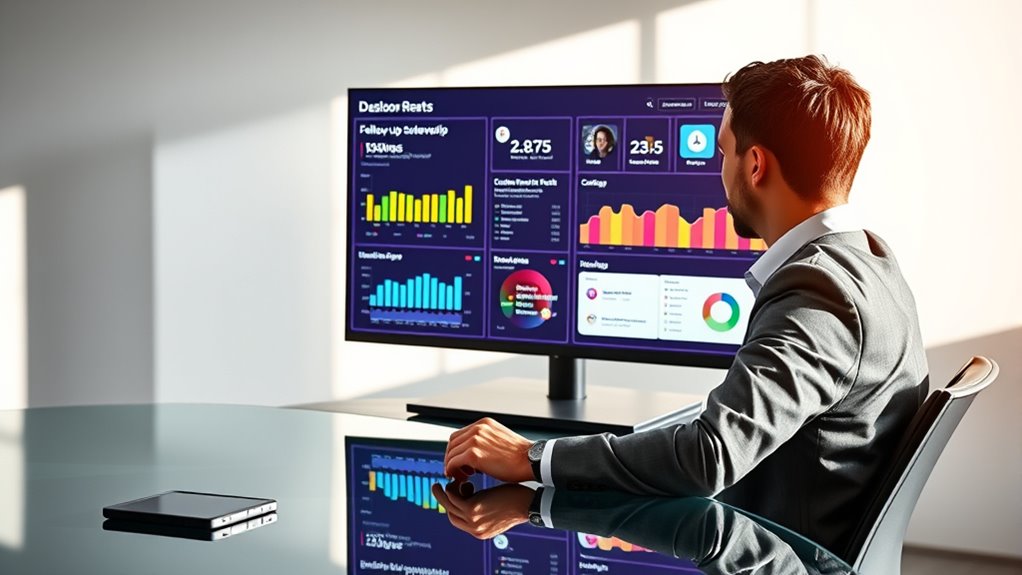Leveraging CRM tools helps you automate and personalize your customer follow-up efforts, saving time and reducing errors. With automated reminders, you can stay on top of check-ins, appointments, or payments without manual effort. Personalization allows you to tailor messages based on customer preferences and purchase history, increasing engagement. Tracking response data helps refine your approach for better results. If you continue exploring, you’ll discover how to maximize these strategies to boost your direct sales success.
Key Takeaways
- Automate personalized follow-up reminders to ensure timely communication without manual effort.
- Use CRM data to tailor messages based on customer preferences and purchase history.
- Implement automated workflows combining reminders and personalization to strengthen customer relationships.
- Track response metrics to optimize follow-up strategies and improve engagement.
- Leverage CRM insights to turn follow-up into a strategic tool for increasing sales and customer satisfaction.

Are you making the most of your customer follow-up efforts? If not, it’s time to leverage CRM tools more effectively to boost your results. One of the most powerful features of modern CRM systems is the ability to send automated reminders. These reminders ensure you stay on top of your follow-up schedule without manual effort, reducing the risk of forgetting important prospects or clients. Automated reminders can alert you when to check in, follow up on a conversation, or remind a customer about upcoming appointments or payments. They help you stay organized and consistent, which builds trust and shows your clients you’re attentive to their needs.
Automated reminders keep your follow-up schedule on track, saving time and building client trust effortlessly.
But automation isn’t just about reminders; it’s also about delivering personalized messaging that resonates with your customers. A good CRM allows you to tailor your communication based on customer preferences, behaviors, and purchase history. Instead of sending generic messages, you can craft personalized outreach that makes each customer feel valued and understood. For example, if a client recently purchased a product, your CRM can trigger a personalized follow-up thanking them and suggesting related items. This kind of targeted communication increases engagement, drives loyalty, and boosts your chances of closing sales.
Using CRM tools, you can set up automated workflows that combine reminders with personalized messaging. Imagine a scenario where, after a customer makes a purchase, your system automatically schedules a follow-up email a week later, thanking them and asking for feedback. That email can include personalized details, like their name and specific product, making the interaction feel genuine and relevant. When your follow-up feels tailored, customers are more likely to respond positively, strengthening your relationship and encouraging repeat business.
Another advantage of integrating automated reminders and personalized messaging is the ability to track and analyze responses. CRM platforms often provide insights into open rates, click-throughs, and reply rates, allowing you to refine your follow-up strategies over time. You can identify which messages resonate most and adjust your approach accordingly, ensuring your follow-up efforts become increasingly effective.
Ultimately, leveraging CRM tools to automate reminders and personalize your messages transforms your follow-up process from a tedious task into a strategic advantage. You’ll spend less time on manual outreach and more time focusing on building genuine relationships with your clients. This targeted, timely approach not only enhances customer satisfaction but also increases your chances of closing sales, growing your network, and establishing a strong reputation in your industry. With the right CRM setup, your follow-up efforts will become more efficient, effective, and impactful.
Frequently Asked Questions
How Do CRM Tools Integrate With Existing Sales Platforms?
You can integrate CRM tools with your sales platforms by connecting through APIs or built-in integrations. Be aware of potential integration challenges like data synchronization issues, which can cause delays or inaccuracies. To minimize these problems, verify your systems are compatible and regularly monitor data flow. Proper setup allows seamless updates, improved customer follow-up, and a unified view of sales activities, ultimately boosting your efficiency and sales success.
What Training Is Needed for Effective CRM Utilization?
You need extensive training strategies to master CRM tools and boost user adoption. Start with hands-on workshops that make complex features feel like second nature. Use role-playing exercises to simulate real sales scenarios, ensuring you’re confident in follow-up tasks. Regular refreshers keep skills sharp, while mentorship programs encourage quick problem-solving. The more engaging and practical your training, the faster you’ll harness CRM power, transforming customer follow-up into a seamless, effortless process.
How Can CRM Data Improve Personalized Customer Interactions?
CRM data boosts your personalized customer interactions by enabling precise customer segmentation, so you target the right audience with relevant messages. Automation processes help streamline follow-ups, ensuring timely communication without extra effort. You can tailor offers and support based on individual preferences and behaviors, creating a more engaging experience. This proactive approach fosters trust and loyalty, ultimately driving sales growth and strengthening your relationship with each customer.
What Are Common Challenges in CRM Adoption?
Ever wondered why CRM adoption stalls? You might face hurdles like low user engagement or resistance to change. Sales automation tools can seem overwhelming, causing frustration. Training gaps and lack of management support also hinder progress. To overcome these, you need clear communication, ongoing training, and incentives that motivate your team. When everyone’s on board, CRM transforms from a challenge into a powerful asset, boosting your customer follow-up and sales success.
How Secure Is Customer Data Within CRM Systems?
Your customer data within CRM systems is generally secure if providers use strong data encryption and robust access controls. Data encryption safeguards information both in transit and at rest, while access controls ensure only authorized individuals can view sensitive data. However, you should always verify your CRM provider’s security measures and stay vigilant about updates and best practices to maintain your customers’ confidentiality and trust.
Conclusion
By leveraging CRM tools effectively, you can boost your customer follow-up rates and strengthen relationships. Remember, businesses that follow up with leads within five minutes are 100 times more likely to engage than those waiting longer. So, use your CRM to stay proactive, personalized, and timely. This simple shift can markedly improve your sales conversions and customer loyalty, giving you a competitive edge in direct sales. Stay consistent, and watch your results grow.









